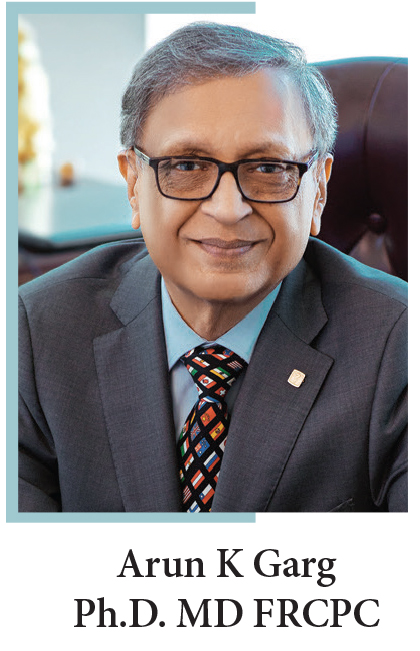By Arun K Garg, PhD, MD FRCPC,
Medical Lead, South Asian Health Institute, Fraser Health (www.fraserhealth.ca), Clinical Professor, Faculty of Medicine. The University of British Columbia.
Inflammation is a word derived from the Latin “inflammation” (“to set on fire” or “to inflame”). It is the body’s response to fight diseases to keep it healthy.
Our understanding of inflammation forms the basis of health. “Injury” can be acute or chronic. Infection from invading microbes is the primary cause of acute inflammation, a sudden body response to harmful stimuli. Acute inflammation brings healing, restoration, and recovery from injury. Cardinal signs were flushed skin, pain, swelling skin, hot to the touch, and loss of function. Usually, it resolves in a short time insult (injury or infection).
Another type of inflammation is more complex and a significant component of most chronic diseases like diabetes, autoimmune disorders, cancer, dementia, obesity, metabolic disorders, and arthritis, to mention a few.
So, understanding inflammation is becoming critical for good health. Lifestyle health management involves inflammation, which is the science behind all interventions quoted in Lifestyle Medicine. Thus, understanding the science behind chronic inflammation is essential. This helps us motivate and self-manage to be healthy. Chronic inflammation is impacted both by nature and nurture. Nature is responsible for genetics. Thus, many autoimmune disorders, inflammatory bowel disease, and neurodegenerative disorders have a basis in nature. As science gets better, prevention and management will improve. However, nurture is still responsible for a significant part of chronic inflammation; this is the basis of lifestyle interventions.
The main components are nutrition/diet, stress, sleep, and physical activity. Some of the lifestyle inflammation influencers are air pollution, chronic negative physical and emotional stress, environmental contamination, an inactive lifestyle, processed food, smoking, and excessive alcohol intake. Thus, we can influence and reduce our exposure to these influencers.
For food and diet, much has been written; suffice it to say, habits around food like when you eat, why you eat, how you eat, how much you eat, and what you eat. Please see my videos on YouTube, 5 Ks of Eating. Increase plant-based eating, control portion size, and reduce carbohydrate serving. Carbohydrate awareness is a low-hanging fruit for our community; try to add proteins and reduce carbohydrate servings (only one primary carbohydrate with a meal—a choice of roti, rice, or potato; choose only one, not all 3). The meal should balance healthy fats, carbohydrates, and proteins. This simple change can reduce the onset of chronic diseases like diabetes.
In addition to food and nutrition, pay attention to physical activity and body weight. Do not smoke, and get enough sleep. One area that often gets neglected is oral health. Oral health may be a silent cause of chronic inflammation, so pay special attention to it.
Now, we will focus on external interventions to reduce inflammation. Pharmacological treatments are the mainstay, and many classes of drugs are available. These are administered through your physicians and other health care providers. The recent advent of “biologics” has changed the management of chronic inflammation-related diseases. Another emerging area is our understanding of GUT, the brain connection. The gut is called the second brain, and billions of microbes in the large intestine play a significant role in the pathobiology of chronic inflammation.
Finally, the role of self-awareness, self-realization, and self-empowerment and your health are emerging as the major components of good health. I call this internal intervention. Along with lifestyle interventions, this forms the foundation of a healthy life and living. So, a fantastic, healthy, and harmonious 2025 to you all. As you recharge, I hope you include some of these interventions for better health.



